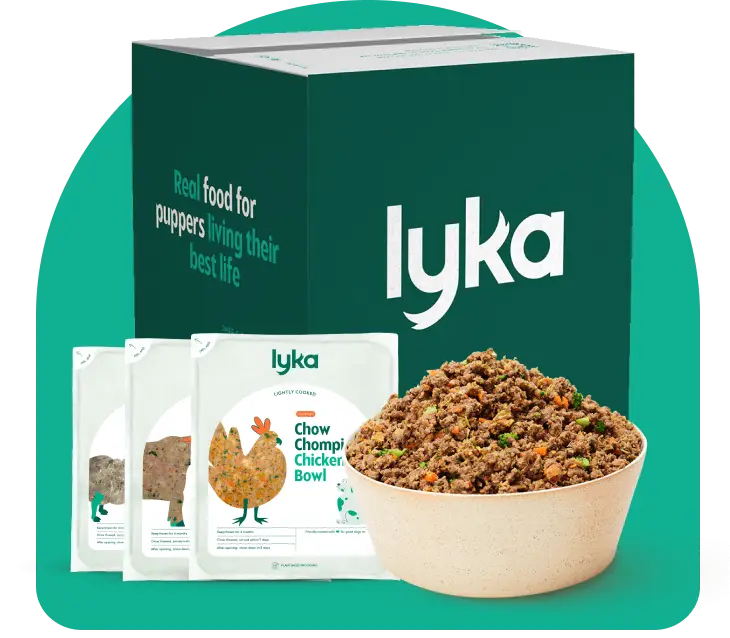Why are we adding grains to our Lyka recipes?
By Lyka Staff

At Lyka, we’re always researching the latest information on nutrition so that we can refresh our recipes and incorporate ingredients that are shown to offer the biggest health benefits to your pupper.
So, when we learned about the emerging evidence about one grain in particular, we knew it was too good to ignore. Our in-house Integrative Vet, Dr. Matthew Muir, consulted with a veterinary nutritionist who agreed that this powerful grain needed to join the Lyka ingredient line-up. Organic white quinoa is in our Lamb and Turkey recipe, whilst our Chicken, Beef, Roo and Fish recipes continue to be grain-free.
We’ve always aimed to keep carbohydrate levels at around 10-15% (of dry matter) across all of our recipes – most of which comes from vegetables like purple sweet potato. Adding new ancient grains to our Lamb and Turkey recipes will still keep the carbohydrate content at around this range. Most commercial dry foods, including grain-free, can contain up to 60% carbs. As high carbohydrate diets are increasingly linked to metabolic stress, we believe Lyka recipes are a healthier option for your pup.
Why aren’t we staying grain-free?
Simply being grain-free isn’t enough to ensure that your pup’s food is healthy. Many grain-free foods contain other ‘non-grain’ ingredients, which may offer little to no health benefits. It’s often a matter of how much is present in the food. For example, legumes may have health benefits in small amounts, but high levels (as is the case in many grain-free foods) can actually cause health issues for your pup.
As for grains themselves, well, they’re not all created equally! Many are best avoided, but some are great for your furry friend when given in moderation. The grains that we’re including in certain Lyka recipes have been carefully selected based on the following health benefits:
They’re a great source of fibre
The grains we use are low GI, gluten-free and have beneficial phytonutrients
The amount of grains in our recipes is very low at a maximum of 6% compared to other pet foods, especially kibble, which can contain up to 60%
They may encourage diversity of the microbiome – this is based on evidence suggesting that a 100% grain-free diet may lead to a microbiome with poor diversity
Our top grain picks
Organic white quinoa
Quinoa contains all of the essential amino acids for dogs, making it a great source of protein
It’s a source of slowly fermentable fibre, which is good for the gut microbiome
Antioxidants quercetin and kaempferol in white quinoa have been shown to lower blood pressure and inflammation in humans
It contains bioactive peptides that may play a role in managing diabetes
Interesting fact: Quinoa is actually a pseudocereal – which strictly speaking, is a ‘non-grass’ but used in a similar way to a grain. Health benefits have been shown in humans and we believe our puppers may benefit in the same way.
Which grains aren’t we using?
We won’t use legumes or beet pulp in our meals. Both are linked to a potentially serious heart issue in pups called canine dilated cardiomyopathy (DCM), which can be caused by reduced levels of the amino acid, taurine. We also won't use:
Wheat: It contains gluten, which can be allergenic to some dogs.
Millet: Whilst it’s rich in B-vitamins and iron, studies have linked it to decreased thyroid function.
High GI grains: Potatoes, rice and corn are carbohydrate sources that are high GI, which may be linked to inflammation associated with some chronic diseases.
Buckwheat: The evidence is inconsistent, however buckwheat in the diet has been linked to increased incidence of liver disease. As further evidence arises our view may change, but as a precaution, buckwheat is not currently included in our recipes.
Nutrition comes first at Lyka
Forget the buzzwords and the fads. At Lyka, we care about science-backed nutrition, plain and simple – whilst also being super tasty! We are always staying up to date with the latest nutritional research and evidence, with our in-house vet, Dr. Matthew Muir, offering his clinical expertise and experience, and regularly consulting with a veterinary nutritionist for all recipe changes and formulations, making sure you have complete confidence in the products we offer. As further research becomes available, we’ll continue to act on it to ensure we are providing the healthiest ingredients for your puppers – they are family after all!





